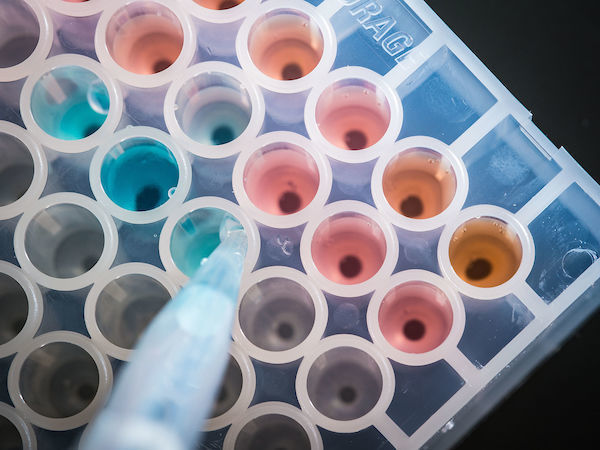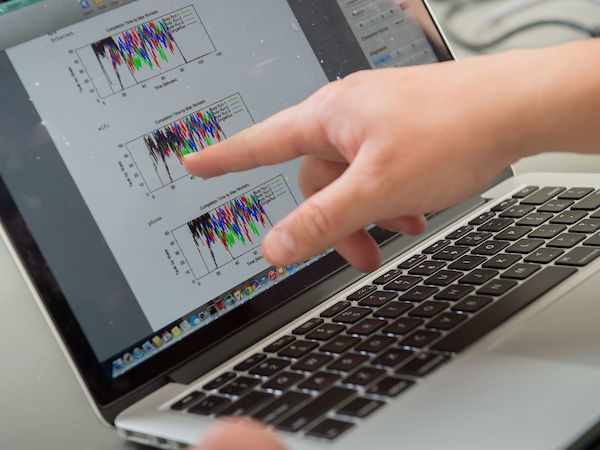
How the Genomics and Bioinformatics Core Facility helps solve health and other research questions

When it comes to battling disease and maintaining healthy environments, DNA sequencing can be imperative to success. At the University of Notre Dame, the Genomics and Bioinformatics Core Facility (GBCF) supports research in many areas that increasingly rely on DNA sequencing, including cancer biology, vector-borne diseases, the development of drug and antibiotic resistance, monitoring invasive species, and much more.
The GBCF has two distinct groups: Genomics and Bioinformatics. Michael Pfrender - the GBCF Faculty Director, associate professor of biological sciences, and an affiliated faculty member of the Eck Institute for Global Health (EIGH) and the Notre Dame Environmental Change Initiative (ECI) – explains how the two groups work together, “On the genomics side, our staff generates the raw sequencing data. We then pass the data to the bioinformatics group who provide the data processing and analysis critical to the researchers who apply the gathered information to their study.”
Pfrender works as part of the genomics team at the facility where he and the staff help guide faculty in their experiment design as well as in identifying the appropriate technology for specific genome sequencing needs. The bioinformatics group is lead by Scott Emrich, the Director of Bioinformatics at the GBCF, associate research professor of computer science and engineering, and also affiliated faculty of the EIGH and ECI. The bioinformatics team supports researchers by offering a wide range of standard and custom analysis of genomic data, development of new bioinformatics tools, and data management. However, both Emrich and Pfrender work very closely with each other’s groups to get the best results for the researchers who use the GBCF.

A recent example of the integration of innovative genomics and bioinformatics contributing to advances in disease research comes from Miguel Morales’ lab. Morales, an assistant professor of biological sciences and an affiliate of the EIGH, studies the evolution of drug resistance in the parasite that causes Leishmaniasis, an insect vector-borne, deadly disease that affects more than 500,000 individuals each year. Currently, there are significant concerns that drug resistance may compromise the sole effective drug for this disease.
On the genomics side of the facility, Morales can use a combination of RNA- and DNA-sequencing to gather raw data about the parasite that causes Leishmania. However, to utilize the data, the bioinformatics side of the facility will examine the expressed genes and variation in the genome sequence. This allows Morales to understand how the laboratory strain of the parasite builds resistance to the drug and potentially find ways to stop resistance.
“Many of the research areas being studied at Notre Dame focus on the study of non-model systems, like malaria and other vector diseases, where often well-established genomics and bioinformatics techniques are lacking,” said Emrich. “Having the genomics and bioinformatics groups in one facility helps us to innovate and develop a customized plan to address cutting-edge questions and act as not only an equipment resource, but an informational asset as well.”
The GBCF provides state-of-the-art technology and quality services for genomics experiments and bioinformatics analysis needed by the Notre Dame research community. The facility also provides education and training opportunities for researchers from undergraduate students to faculty members through workshops, seminars, or even individual training. The GBCF is an Indiana Clinical and Translational Sciences Institute approved Core Facility that is open to Notre Dame researchers as well as other academic institutions and industry. If you would like to learn more about the Genomics and Bioinformatics Core Facility, please visit genomics.nd.edu.
Contact:
Melissa Stephens / Assistant Director
Genomics and Bioinformatics Core Facility / University of Notre Dame
stephens.49@nd.edu / 574.631.0338
About Notre Dame Research:
The University of Notre Dame is a private research and teaching university inspired by its Catholic mission. Located in South Bend, Indiana, its researchers are advancing human understanding through research, scholarship, education, and creative endeavor in order to be a repository for knowledge and a powerful means for doing good in the world. For more information, please see research.nd.edu or @UNDResearch.